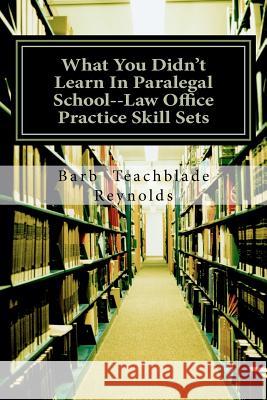What You Didn't Learn In Paralegal School--Law Office Practice Skill Sets » książka
What You Didn't Learn In Paralegal School--Law Office Practice Skill Sets
ISBN-13: 9781475050929 / Angielski / Miękka / 2012 / 46 str.
This book is a Paralegal's Companion-Expert teaching of textbook law in law office skills context. If you haven't read what you're looking for, you've come to the right place. This Book teaches you how to read and interpret all Codes, Statutes and Rules of Law. You Must know how to interpret the rules of law. After all, the rules of law govern the fight, before you ever have to read a case. The rules of law determine the rights and obligations of the parties toward one another. The rules of law are the predicate upon which the court referees the fight between the parties. In addition, this Book provides a road map in how Lawyers think through the procedural phases of a case toward settlement and resolution. Understanding the nuts and bolts of how the Lawyer processes each case phase goes a long way in your helping move cases. The Thinking Process involves an analysis of 1 or more of the following steps: Linear Reasoning (an analysis of Time Lines in the office client's case of events or non-events occurring over an extended period of time; and/or Analogical Reasoning (an analysis of a base case and the facts of your office client's case for similarities, dissimilarities and interpretation; and/or Deductive Reasoning, (an analysis of the elements of a common-law cause of action, a statute or other rule of law in civil law and criminal law, ) that you can learn to help move the case to the next phase. Paralegals want Lawyers to give them more responsibility, which presupposes they're prepared to assist more. The Measurable results? Ability to locate and analyze both civil and criminal statutes and separate each into their individual elements, analyze the literal interpretation of each element and compare the elements of the rule to the office client's case facts, make a preliminary determination of whether or not all the elements of the rule of law are satisfied by the client's fact pattern and what causes of action are actionable. Fact patterns are in subsequent chapters of the Book that reinforce ongoing analysis of how Linear, Analogical and Deductive Reasoning are applied to case facts. Ability to know the distinction between the conjunctive "and" and the disjunctive "or" in analyzing a crime. Ability to assist in the initial client intake session to gather information concerning an automobile case; a criminal defense case or prosecution. After performing a client interview in a P.I. case, a Paralegal should have obtained answers to pertinent questions about damages, enabling the Lawyer to make an informed decision about representation.
Zawartość książki może nie spełniać oczekiwań – reklamacje nie obejmują treści, która mogła nie być redakcyjnie ani merytorycznie opracowana.











